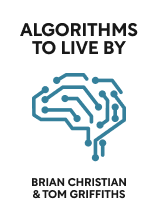

This article is an excerpt from the Shortform book guide to "Algorithms to Live By" by Brian Christian and Tom Griffiths. Shortform has the world's best summaries and analyses of books you should be reading.
Like this article? Sign up for a free trial here .
Is Brian Christian and Tom Griffiths’ Algorithms to Live By worth reading? What is the key message to take away from the book?
In their book Algorithms to Live By, Brian Christian and Tom Griffiths make the case that computer science, a field that’s typically seen as highly specialized, actually contains a wealth of practical knowledge we can use to improve our lives. The authors argue that by utilizing the same strategies as computers, we can process tasks with blinding efficiency and quickly come up with creative solutions to complex problems.
Here is our review of Algorithms to Live By: The Computer Science of Human Decisions.
About the Authors
Brian Christian is one of the rare few to find critical success in both scientific and artistic fields. His academic work on human biases has been published in periodicals such as Cognitive Science, and his popular science writing has been featured in Best American Science & Nature Writing. His poetry, on the other hand, has been nominated for the Pushcart Prize and adapted into a short film.
Christian has received the most public recognition for his non-fiction writing career—along with Algorithms to Live By, he is the author of the award-winning books The Most Human Human (2011), an exploration of what it means to be human in light of rapidly advancing artificial intelligence, and The Alignment Problem (2020), a diagnosis of what Christian sees as the most serious danger posed by the rise of artificial intelligence—the threat that computers will do what we tell them to do, but not what we truly want or need.
He holds a bachelor’s degree in computer science and philosophy from Brown University, as well as an MFA in poetry from the University of Washington.
Connect with Brian Christian:
Tom Griffiths is an esteemed career academic specializing in human cognition. Most notably, Griffiths served at UC Berkeley for 12 years, entering as an assistant professor in 2006, becoming director of their Institute of Cognitive and Brain Sciences in 2010, and getting promoted to full professor in 2015. He took a job at Princeton University in 2018 and currently heads the Computational Cognitive Science Lab there.
Griffiths has a Ph.D. in Psychology as well as master’s degrees in Psychology and Statistics from Stanford University.
Connect with Tom Griffiths:
The Book’s Publication
Publisher: Macmillan Publishers
Imprint: Henry Holt and Co.
Algorithms to Live By was published in 2016 and would eventually become Brian Christian’s most popular book, gaining more attention than The Most Human Human and The Alignment Problem. It’s Griffiths’s first and only published book.
Algorithms to Live By is the odd one out in Christian’s bibliography—it’s far more prescriptive and less exploratory than his other works. Additionally, Tom Griffiths’s contributions make Algorithms feel more academic, like an entry-level computer science course, compared to the creative nonfiction style of Christian’s other books.
Critical Reception
MIT Technology Review named Algorithms to Live By one of their best books of the year. The book also received positive reviews in The Guardian, The New York Times, and Forbes (earning a spot on the magazine’s list of the “Must-Read Brain Books of 2016”). The book became Amazon’s #1 bestselling book in Science, as well as Audible’s #1 bestselling nonfiction audiobook.
Audiences praise the book for its accessible approach to computer science, giving the authors credit for effortlessly deconstructing complicated ideas without oversimplifying or talking down to the reader. Many readers, even those who were initially skeptical of the premise, claim they were surprised by how practical and useful the authors’ algorithms proved to be. Additionally, audiences enjoy the broad range of topics which keep the book consistently fresh and interesting.
Those who dislike the book feel that the authors’ claims don’t translate well into the real world, arguing that the book works better as an introduction to computer science than as a practical guide to live by. Some found Christian and Griffiths’s tone too dry to hold their attention for the entirety of the book. Finally, some disagreed with the book’s assumption that productivity and efficiency are universal human goals, arguing that Algorithms’s advice focuses less on how to live a good life and more on how to complete tasks like a machine.
Commentary on the Book’s Approach
Algorithms to Live By draws its ideas from the field of computer science, as well as adjacent mathematical disciplines such as statistics and game theory. Christian and Griffiths describe the strategies and solutions that scientists in these fields use to solve computational problems, then speculate as to how humans can apply these same strategies and solutions to their own lives.
That being said, Christian and Griffiths approach Algorithms to Live By as a primer in computer science first and a collection of life advice second. Within each chapter, the authors trace their way through a concept from computer science, connecting it to real life when convenient but prioritizing a coherent lesson in computing. Chapters 3 (“Sorting”) and 10 (“Networking”) especially emphasize computer science over real-life practicality.

———End of Preview———
Like what you just read? Read the rest of the world's best book summary and analysis of Brian Christian and Tom Griffiths's "Algorithms to Live By" at Shortform .
Here's what you'll find in our full Algorithms to Live By summary :
- How to schedule your to-do list like a computer
- Why making random decisions is sometimes the smartest thing to do
- Why you should reject the first 37% of positions in your job search






